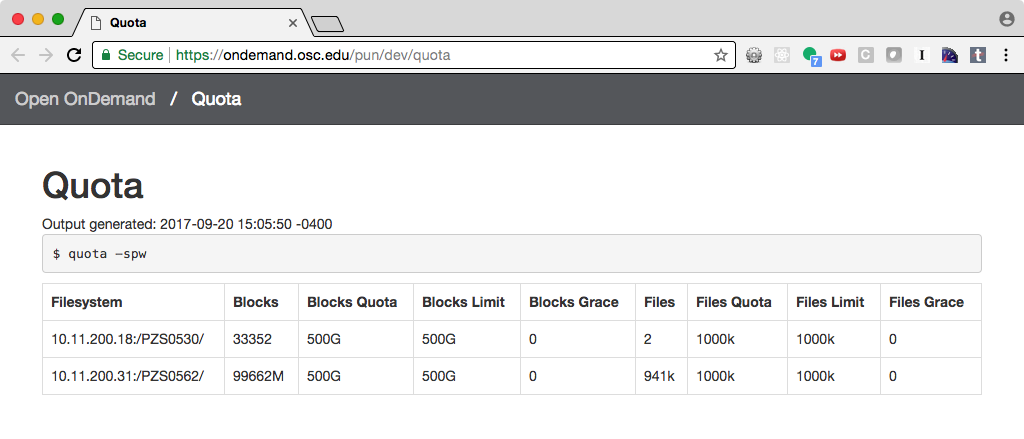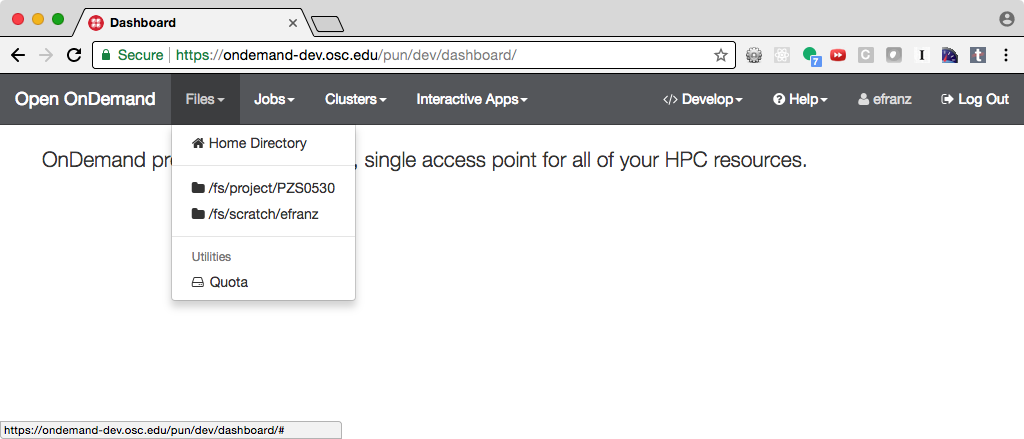Creating a status app¶
Overview of app¶
We will make a copy of a status app that displays the running Passenger processes on the OnDemand host. We will use this as a starting point to create a new status app that displays quota information in a table.
The app we will be copying is: https://github.com/OSC/ood-example-ps. Running this app looks like:

Fig. 6 What app looks like after cloning and launching.
After this tutorial the resulting app will be:

Fig. 7 What app looks like after modifying in this tutorial.
This assumes you have followed the directions to Enabling App Development on the Dashboard.
- The app uses the custom branded Bootstrap 3 that Job Composer and Active Jobs apps use.
- The navbar contains a link back to the dashboard.
- On a request, the app runs a shell command, parses the output, and displays the result in a table.
- It is built in Ruby using the Sinatra framework, a lightweight web framework similar to Python’s Flask and Node.js’s Express
Benefits¶
This serves as a good starting point for any status app to build for OnDemand, because
- the app has the branding matching other OnDemand apps
- all status apps will do something similar on a request to the app:
- get raw data from a shell command or http request
- parse the raw data into an intermediate object representation
- use that intermediate object representation to display the data formatted as a table or graph
- the app can be deployed without requiring a build step because gem
dependencies (specified in
GemfileandGemfile.lock) are pure ruby and versioned with the app undervendor/bundle - most of the app can be modified without requiring a restart due to proper use of Sinatra reloader extension
- app has a built in scaffold for unit testing using minitest
Files and their purpose¶
| File | Description |
|---|---|
| config.ru | entry point of the Passenger Ruby app |
| app.rb | Sinatra app config and routes; this in a separate file from config.ru so that code reloading will work |
| command.rb | class that defines an AppProcess struct, executes ps, and parses the output of the ps command producing an array of structs |
| test/test_command.rb | a unit test of the parsing code |
| views/index.html | the main section of the html page template using an implementation of ERB called erubi which auto-escapes output of ERB tags by default (for security) |
| views/layout.html | the rendered HTML from views/index.html is inserted into this layout, where css and javascript files are included |
| File | Description |
|---|---|
| Gemfile, Gemfile.lock | defines gem dependencies for the app (see Bundler’s Rationale) |
| vendor/bundle | installed and versioned gem dependencies |
| tmp/ | tmp directory is kept so its easier to touch tmp/restart.txt when you
want to force Passenger to restart an app |
| public/ | serve up static assets like Bootstrap css; in OnDemand, NGINX auto-serves all files under public/ directly, without going through the Passenger process, which makes this much faster; as a result, each static file is in a directory with an explicit version number, so if these files ever change we change the version, which is one cache busting strategy |
| Rakefile | this provides a default Rake task for running the automated tests under
test/, so you can run the tests by running the command rake |
| test/minitest_helper.rb | contains setup code common between all tests |
Clone and setup¶
- Login to Open OnDemand, click “Develop” dropdown menu and click the “My Sandbox Apps (Development)” option.
- Click “New Product” and “Clone Existing App”.
- Fill out the form:
- Directory name:
quota - Git remote:
https://github.com/OSC/ood-example-ps - Check “Create new Git Project from this?”
- Click Submit
- Directory name:
- Launch the app by clicking the large blue Launch button. In a new browser window/tab you will see the output of a ps command filtered using grep.
- Switch browser tab/windows back to the dashboard Details view of the app and click “Files” button on the right to open the app’s directory in the File Explorer.
Edit to run and parse quota¶
The app runs and parses this command:
ps aux | grep '[A]pp'
We will change it to run and parse this command:
quota -spw
Update test/test_command.rb¶
Run the command to get example data. Copy and paste the output into the test, and update the assertions to expect an array of “quotas” instead of “processes” with appropriate attributes.
Diff:
def test_command_output_parsing
output = <<-EOF
-
-efranz 30328 0.1 0.1 462148 28128 ? Sl 20:28 0:00 Passenger RackApp: /users/PZS0562/efranz/ondemand/dev/quota
-
+Disk quotas for user efranz (uid 10851):
+ Filesystem blocks quota limit grace files quota limit grace
+10.11.200.32:/PZS0562/ 99616M 500G 500G 0 933k 1000k 1000k 0
EOF
- processes = Command.new.parse(output)
+ quotas = Command.new.parse(output)
- assert_equal 1, processes.count
+ assert_equal 1, quotas.count, "number of structs parsed should equal 1"
- p = processes.first
+ q = quotas.first
- assert_equal "efranz", p.user
- assert_equal "462148", p.vsz
- assert_equal "28128", p.rss
- assert_equal "0:00", p.time
- assert_equal "Passenger RackApp: /users/PZS0562/efranz/ondemand/dev/quota", p.command
+ assert_equal "10.11.200.32:/PZS0562/", q.filesystem, "expected filesystem value not correct"
+ assert_equal "99616M", q.blocks, "expected blocks value not correct"
+ assert_equal "500G", q.blocks_limit, "expected blocks_limit value not correct"
+ assert_equal "933k", q.files, "expected files value not correct"
+ assert_equal "0", q.files_grace, "expected files_grace value not correct"
end
Resulting test method:
class TestCommand < Minitest::Test
def test_command_output_parsing
output = <<-EOF
Disk quotas for user efranz (uid 10851):
Filesystem blocks quota limit grace files quota limit grace
10.11.200.32:/PZS0562/ 99616M 500G 500G 0 933k 1000k 1000k 0
EOF
quotas = Command.new.parse(output)
assert_equal 1, quotas.count, "number of structs parsed should equal 1"
q = quotas.first
assert_equal "10.11.200.32:/PZS0562/", q.filesystem, "expected filesystem value not correct"
assert_equal "99616M", q.blocks, "expected blocks value not correct"
assert_equal "500G", q.blocks_limit, "expected blocks_limit value not correct"
assert_equal "933k", q.files, "expected files value not correct"
assert_equal "0", q.files_grace, "expected files_grace value not correct"
end
end
Update command.rb¶
Run test by running rake command and you will see it fail:
$ rake
Run options: --seed 58990
# Running:
F
Finished in 0.000943s, 1060.4569 runs/s, 1060.4569 assertions/s.
1) Failure:
TestCommand#test_command_output_parsing [/users/PZS0562/efranz/ondemand/dev/quota/test/test_command.rb:14]:
number of structs parsed should equal 1.
Expected: 1
Actual: 3
1 runs, 1 assertions, 1 failures, 0 errors, 0 skips
rake aborted!
Command failed with status (1)
Tasks: TOP => default => test
(See full trace by running task with --trace)
Warning
To run commands like rake through the shell you need to make sure you are on a host that has the correct version of Ruby installed. For OnDemand that likely means using Software Collections with the same packages used to install OnDemand.
With SCL, running rake with rh-ruby24 package looks like:
scl enable rh-ruby24 -- rake
With SCL, running git commands using rh-git29 looks like:
scl enable rh-git29 -- git commit -m "initial commit"
You can avoid this by loading the SCL packages in your .bashrc or .bash_profile file. For example, in my .bash_profile I have:
if [[ ${HOSTNAME%%.*} == webtest04* ]]
then
scl enable rh-ruby24 rh-nodejs6 rh-git29 -- bash
fi
This means when I login to the host webtest04.osc.edu the SCL packages will be enabled
in a new bash session. If you did the same you would replace webtest04 with the hostname
of your development node.
Change the command we are using, fix the command output parsing, and fix the struct definition so the unit test passes.
class Command
def to_s
- "ps aux | grep '[A]pp'"
+ "quota -spw"
end
- AppProcess = Struct.new(:user, :pid, :pct_cpu, :pct_mem, :vsz, :rss, :tty, :stat, :start, :time, :command)
+ Quota = Struct.new(:filesystem, :blocks, :blocks_quota, :blocks_limit, :blocks_grace, :files, :files_quota, :files_limit, :fil
# Parse a string output from the `ps aux` command and return an array of
# AppProcess objects, one per process
def parse(output)
lines = output.strip.split("\n")
- lines.map do |line|
- AppProcess.new(*(line.split(" ", 11)))
+ lines.drop(2).map do |line|
+ Quota.new(*(line.split))
end
end
After the changes part of the command.rb will look like this:
class Command
def to_s
"quota -spw"
end
Quota = Struct.new(:filesystem, :blocks, :blocks_quota, :blocks_limit, :blocks_grace, :files, :files_quota, :files_limit, :files_grace)
# Parse a string output from the `ps aux` command and return an array of
# AppProcess objects, one per process
def parse(output)
lines = output.strip.split("\n")
lines.drop(2).map do |line|
Quota.new(*(line.split))
end
end
Now when we run the test they pass:
$ rake
Run options: --seed 60317
# Running:
.
Finished in 0.000966s, 1035.1494 runs/s, 6210.8963 assertions/s.
1 runs, 6 assertions, 0 failures, 0 errors, 0 skips
Update app.rb and view/index.html¶
Update app.rb:
helpers do
def title
- "Passenger App Processes"
+ "Quota"
end
end
# Define a route at the root '/' of the app.
get '/' do
@command = Command.new
- @processes, @error = @command.exec
+ @quotas, @error = @command.exec
# Render the view
erb :index
end
In view/index.html, replace the table with this:
<table class="table table-bordered">
<tr>
<th>Filesystem</th>
<th>Blocks</th>
<th>Blocks Quota</th>
<th>Blocks Limit</th>
<th>Blocks Grace</th>
<th>Files</th>
<th>Files Quota</th>
<th>Files Limit</th>
<th>Files Grace</th>
</tr>
<% @quotas.each do |quota| %>
<tr>
<td><%= quota.filesystem %></td>
<td><%= quota.blocks %></td>
<td><%= quota.blocks_quota %></td>
<td><%= quota.blocks_limit %></td>
<td><%= quota.blocks_grace %></td>
<td><%= quota.files %></td>
<td><%= quota.files_quota %></td>
<td><%= quota.files_limit %></td>
<td><%= quota.files_grace %></td>
</tr>
<% end %>
</table>
These changes should not require an app restart. Go to the launched app and reload the page to see the changes.
Brand App¶
The app is looking good, but the details page still shows the app title “Passenger App Processes”. To change this and the icon, edit the manifest.yml:
-name: Passenger App Processes
-description: Display your running Passenger app processes in a table
+name: Quota
+description: Display quotas
+icon: fa://hdd-o
- The icon follows format of
fa://{FONTAWESOMENAME}where you replace{FONTAWESOMENAME}with an icon from https://fontawesome.com/icons/. In this case we are usingfa-hdd-owhich we write in the manifest asfa://hdd-o. You can see details on this icon at https://fontawesome.com/icons/hdd?style=regular
Publish App¶
Publishing an app requires two steps:
- Updating the manifest.yml to specify the category and optionally subcategory, which indicates where in the dashboard menu the app appears.
- Having an administrator checkout a copy of the production version to a directory under /var/www/ood/apps/sys
Steps:
Add category to manifest so app appears in Files menu:
name: Quota description: Display quotas icon: fa://hdd-o +category: Files +subcategory: Utilities
Version these changes. Click Shell button on app details view, and then commit the changes:
git add . git commit -m "update manifest for production" # if there is an external remote associated with this, push to that git push origin master
As the admin, sudo copy or clone this repo to production
# as sudo on OnDemand host: cd /var/www/ood/apps/sys git clone /users/PZS0562/efranz/ondemand/dev/quota
Reload the dashboard.

Fig. 8 Every user can now launch the Quota from the Files menu.
Warning
Accessing this new app for the first time will cause your NGINX server to restart, killing all websocket connections, which means resetting your active web-based OnDemand Shell sessions.